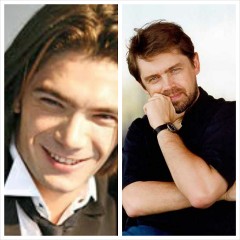|
Back
Mother Russia Without Tears New York
Avery Fisher Hall, Lincoln Center
01/23/2014 - & January 24, 25, 2014
Nicolai Tcherepnin: The Enchanted Kingdom, opus 39
Dmitri Shostakovich: Cello Concerto No. 1, opus 107
Peter Ilyich Tchaikovsky: Suite No. 3, opus 55
Gautier Capuçon (Cello)
Glenn Dicterow (Violin), Philip Myers (French horn), New York Philharmonic Orchestra, Andrey Boreyko (Conductor)

G. Capuçon, A. Boreyko (© New York Philharmonic Orchestra)
”I have never felt myself a greater genius than in writing my ‘Suite’”. P. I. Tchaikovsky
Avery Fisher hall was transformed into St. Peters(burg) Basilica this week. Not only the conductor, Andrey Boreyko, but all three composers were either born in or associated with Peter the Great’s attempt to bring European culture to Mother Russia.
Not that they had much else in common. Nicolai Tcherepnin evolved over the years from his early Firebird attempt. Dmitri Shostakovich, even when jolly in his Cello Concerto, couldn’t help but bring a sense of utter mordancy and desolation.
As for Mr. Tchaikovsky, this was the surprise of the evening. An absolutely ecstatic performance of his Third Suite lacking even the slightest wrinkle, tear or his usual mea culpas.
Except, of course, that Tchaikovsky never called it a Symphony, since it wasn’t deep enough for him. That was a mistake. It was a pastoral, a meditation on nature, and–in the famous final movement–a landscape of Mother Russia herself.
The strings never sounded more velvet, more genial, the melodies soared, and by the time of the final “Theme and Variations”, this was already appealing.
That final movement, though, which George Balanchine made into a ballet, is actually a kind of Bayeaux Tapestry of Mother Russia, each variation painting a different picture. Here was an Imperial Military March, a sad Dies Irae, a gypsy violin (not really gypsy but Concertmaster Glenn Dicterow played with peasant enthusiasm), here was an accordion simulation, a bit of warfare, folk dances, folk songs and folk chorales.
These were the pictures which Mussorgsky always tried to paint and which Tchaikovsky tried to shun. But Andrey Boreyko. 56 years old, has the electrifying movements and enthusiasms of a man half his age. And from a St. Petersburg musical family, he pushed the New York Philharmonic to the ultimate, with a dazzling finish that made 1812 Overture sound like Country Gardens.
Mr. Boreyko’s two weeks with the Philharmonic have been pretty thrilling, though he did choose two rare pieces which perhaps deserve their rarity. Last week, Zemlinsky’s Mermaid was an overweight fairy tale. This week he presented a somnolent Firebird.
The young composer did call it The Enchanted Kingdom, but it was indeed about the firebird. So we must give thanks to Ballet Russes for choosing Stravinsky for the iconic Firebird we know today.
Yes, Tcherepnin knew his orchestra well, he was well in the Rimsky-Korsakov mode of color and effect. Harmonically, this was more like Scriabin, but alas, it was a Scriabin without cajones.
“And so...” (as 1930’s travel documentaries would say)...” as we bid farewell to this enchanted kingdom, “drifting off from endlessly blowing palm trees, sand dunes and radiant sunsets we shall perhaps find even more adventures elsewhere...”
That was the Shostakovich Cello Concerto. Nobody ever played this with more strength and muscular toughness than its dedicatee, Mstislav Rostropovich. But the young French cellist Gautier Capuçon played with both virtuosity (that cadenza was brilliant) and elegiac feeling when necessary. He had, beside Mr. Boreyko and the Phil, blazoning solos by First Horn Philip Myers. This was, in fact, almost a duo Concerto at times. Those two were a formidable pair in this most beguiling concertos.
Harry Rolnick
|